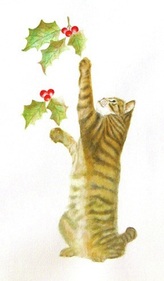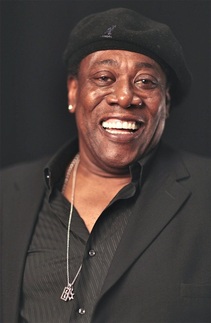
Clarence Clemons was born in Norfolk, Virginia in 1942, the first of three children born to the owner of a fish market. At the age of 9, Clarence asked his parents for a set of electric trains for Christmas. Instead, his father presented him with a saxophone. Clarence was expected to practice every day in the back room of the market, where he helped his father, while the other kids were playing outside and he pretty much hated it. That changed when, at age 18, Clarence first heard King Curtis.
Clarence was recruited by a New Jersey band known as Tyrone Ashley's Funky Music Machine for a few recording sessions and, while attending Maryland State College, worked with the Vibrations, a James Brown cover band. One day, Clarence got a flat tire in front of a New Jersey club and needed to use the phone. Playing the club was a rock band, Norman Seldin & The Joyful Noyze. Clarence, who had long been more interested in playing rock than R&B, asked if he could sit in and, after playing with the Big Man, Seldin hired him on the spot. It's worth mentioning that the music scene was still largely segregated in the late 60s and early 70s. And Seldin lost a lot of work for having a black man in his band but refused to succumb.
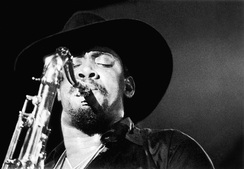
It was a stormy night in Asbury Park. A strong nor'easter was blowing in. Heavy winds, vertical rain, vivid lightning. Clarence opened the door to The Student Prince and the wind literally ripped the door off its hinges and sent it blowing off down the street. Springsteen saw a huge silhouette of a man carrying a saxophone in the doorway, lightning flashing behind him; it was like a panel from a graphic novel. Clemons walked up to Bruce and said, "I want to play with you." Springsteen said, "Hey, you can do anything you want. Take a couple of background singers, anything." The two said they knew instantly that this was rock and roll magic, a pairing that was meant to be. Clarence stayed on with Seldin for another year, but also was recording with Springsteen as Bruce put together his Columbia debut, "Greetings From Asbury Park". Then, deciding this was definitely it, Clarence left his day job and Seldin's band to work full time with Springsteen, earning about $15 a week at the start.
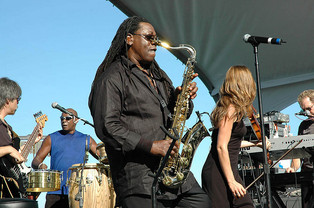
Clarence Clemons had gone through a number of health issues over the years, as many big men do. He experienced chronic back pains and both of his knees were replaced in 2009. But he never let his health issues keep him off the stage. "It's amazing what the stage can do for you," Clemons told PopDose in 2009, near the end of a long tour with Bruce. "It heals me, that time up on the stage."
Upon news of the Big Man's death, Bruce Springsteen released the following statement: "Clarence lived a wonderful life. He carried within him a love of people that made them love him. He created a wondrous and extended family. He loved the saxophone, loved our fans and gave everything he had every night he stepped on stage. His loss is immeasurable..."
In 1981, Clarence opened a club in Red Bank, New Jersey called Big Man's West. The club only lasted about a year and a half. I never saw either Bruce or Clarence play there, on the three or four nights I was at Big Man's West. But I did meet Clemons on one occasion when he was doing the meet and greet thing. Just a handshake and smile is all. But the man radiated warmth and sincerity. Clarence made everyone at his club that night feel special and important; that's a gift. Among the online tributes, I saw one comment from someone who claimed to be a sax player saying Clarence was pretentious and not a very good sax player. Anyone who says Clarence was pretentious clearly never met the man. Anyone who says Clarence wasn't a very good sax player either never heard "Born To Run", "Tenth Avenue Freezeout", "Jungleland", etc. or doesn't understand the first thing about great rock and roll.
Perhaps the best epitaph for Clarence Clemons came from the Big Man himself. Speaking to the Associated Press last year, Clarence said, "Somebody said to me, 'Whenever somebody says your name, a smile comes to their face.' That's a great accolade. I strive to keep it that way."
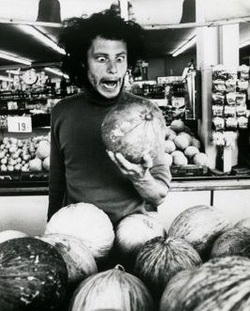
Intending no offense to anyone, I can't help but offer the transitional "from the sublime to the ridiculous" here.
The godfather of DIY/outsider music, a favorite of Doctor Demento, certified paranoid schizophrenic and acid casualty, prolific songwriter and street singer, and the first artist to record for Rhino Records--just some of the credits of Larry "Wild Man" Fischer, who passed away of heart failure at the age of 66 on June 15.
Born in Los Angeles, California in 1944, Lawrence Wayne Fischer began singing and writing his, er, unique songs in his mid-teens. His mother had him committed to Camarillo State Hospital, a mental institution, after he allegedly attacked her with a knife. Once released, Fischer wandered the streets of LA singing whatever tunes came out of his head. On occasion, Fischer would turn up at talent shows.
Solomon Burke was the first to take Larry seriously. It was Burke who dubbed Fischer "Wild Man" and he took his discovery on tour with him. Later on, after another involuntary commitment to Camarillo, it was Frank Zappa who took an interest. Zappa produced the 2 record set "An Evening With Wild Man Fischer", still unavailable on CD. Fischer's relationship with Zappa ended poorly and Larry once again found himself on the streets of LA, offering to sing a "different kind of song" to anyone who would give him ten cents.
Larry took up a regular "residence" in front of the Rhino Records store in 1975 and the shop owners thought it might be worthwhile to have the Wild Man record a theme song for their shop. "Go To Rhino Records" proved to be so popular, it ultimately led to the launch of the Rhino label. For their first album release, Rhino naturally turned to Fischer again, who recorded "Wildmania". In its initial release, "Wildmania" sold 5,000 copies..."which", Rhino's Richard Foos recalls, "gave us enough money to release the next album." Fischer recorded two more albums for Rhino and, save the odd track here and there, that was the extent of his recording career.
In 1999, Rhino Handmade released a box set containing all of Wild Man's Rhino recordings, including his duet with Rosemary Clooney, "It's A Hard Business". From time to time, Wild Man would resurface for a performance or two. Fischer appeared on Jimmy Kimmel Live in 2004 and, in 2005, the documentary Derailroaded was released. An album of "rarities", "Lost And Found Pep", was independently released in 2008.
Wild Man's contribution to the holiday season was a 25 second ditty that is virtually impossible to dislodge from your brain once you've heard it. "I'm A Christmas Tree" appears on the 1981 album, "Pronounced Normal". A slightly longer version (1:13)--a duet with Doctor Demento--was included on the Doctor's "Christmas Novelty" CD and is also included on "Lost And Found Pep".
 RSS Feed
RSS Feed
